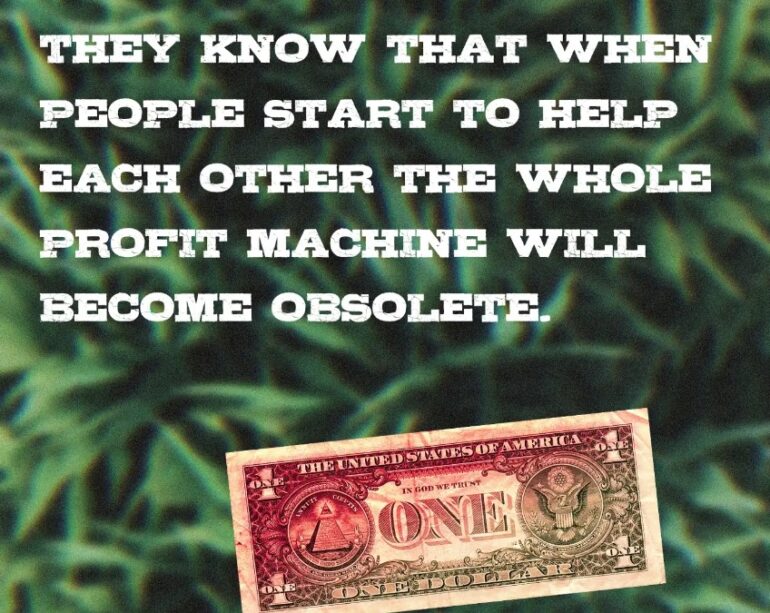If you clicked on this article, you’re probably somewhat knowledgeable/well-versed as to the inherent failures of the capitalist model.
You may have experienced poverty firsthand, or have a healthy amount of empathy and concern for your fellow humans and society at large; whatever enticed you, thank you for being here. Before we dig into the five key things that make capitalism unsustainable, a little about who we are: Moneyless Society is a non-profit devoted to building community and cultivating a more equitable and prosperous economy and society for all in the future. We believe in taking concrete actionable steps in our communities today, and not resting solely on philosophy and good intentions. If after reading this you feel inspired to take action with us, we’d love you to join us by becoming a volunteer and joining our discord.
With that, let’s dive into the 5 key things:
- The need for infinite growth. Infinite growth is by definition unsustainable; every year shareholders always want more and more profit and seek out egregiously unsustainable methods (either economically or environmental, or both) to achieve short term gains, oftentimes at the cost of long-term happiness of employees and the environment and communities at large. Until the competition in the market system stops, and until true collaboration ensues, corporations will only continue to grow and compete for market share, ultimately leaving mass inequality and environmental upheaval in their wake.
- Regulations act as band-aids. While regulation has proved beneficial in curtailing many corporations’ greed and pollution (breaking up large monopolies, the Clean Air and Water Act, etc.), these “guardrails” are a good starting place in theory. But historically, policy reform and new legislation have been partial fixes that merely treat symptoms and sometimes even backfire and exacerbate the issues being addressed. The less effective policies fail to produce the systemic overhaul necessary to create a truly sustainable economy and society. In other words–they don’t do enough, and are merely band-aids to the systemic, cancerous, predatory nature that’s inherent to capitalist economies.
- Requires constant activity and “always on” mentality. “Time is money!” “Hustle culture!” “Get your grind on!” “Girl boss!” Today, practically anything we need or do requires an activity or transaction to take place in which something — either a product or service — is monetized. Every transaction uses resources — and the constant, indiscriminate use of resources is a huge pain point of our economic model; the aim of “infinite” growth is an inextricable part of the capitalist design, and is by definition unsustainable. The alternative–more community options to share resources amongst friends and neighbors — negates the need to buy and own everything (e.g., like a library but for tools or expensive camera equipment you only want to use occasionally, community gardens to share locally grown produce, etc.) and are much healthier and less ego-centric, “always on” and always working, kind of atmosphere and societal structure. It would allow for rest, and encourage time off, and there wouldn’t be the pervasive feeling amongst the collective that if you’re not busy or productive, you must be lazy, unmotivated, and a drain on society.
- The propagandized view that one should personally own everything. This concept is heavily marketed to us since birth/childhood, and promotes not only the culture of constant buying/consumer culture, (i.e., shopping for the sake of shopping/window-shopping when there’s not a true need), but also encourages a) credit card debt and buying outside of your means, but more critically, b) keeps you addicted to the idea that you need to buy and “own” every new thing. We all have a strong predisposition to “shiny-new-toy-syndrome” when it comes to buying products. Personally, I’m a huge sucker/very easily influenced by nice packaging. If something has attention-grabbing, aesthetically pleasing packaging — even if I don’t need said item, (usually a nice candle or makeup or perfume product always gets me) I’ll be much more inclined to impulsively buy it just because it’s pretty and “sparks joy.” And while I fully approve of “treating yourself” (yes please buy yourself fancy coffees/avocado toast/small treats to get through tough workdays!) what I have issue with is the almost compulsive need to shop on a weekly if not daily basis — especially with the ease of 1-click online shopping — and the clutter and things I don’t need only grows and grows. If we lived in a more communal society, I could share resources with neighbors, participate in more garage/yard sales and engage in exchange behavior, to cut down on the “too many things” epidemic. Buying and owning superfluous amounts of things can spark joy if you’re into maximalism, in which case, go for it! But for many, overspending/owning things leads to debt, depression from trying to “keep up with the Jones’s,” lost opportunity at community giving, and only seeks to benefit capitalist owners who profit from said mass consumption.
- We’re incentivized to exploit labor and natural resources. If you are a capitalist, it is in your best interest to produce and sell as much of something as you can to maximize revenue and profits. That means you are directly incentivized to exploit resources for your own personal gain. This incentive runs in direct conflict with the principles of sustainability (and morality for that matter–but we won’t dig into that today). Capitalism incentivizes people to produce and sell as many of something as possible. Sustainable practices, like only providing a service occasionally as needed, entail the opposite.
In conclusion–capitalism is inherently and at it’s core an unsustainable practice and cannot continue as-is indefinitely.
Congress is inefficient and grid-locked the majority of the time, to put it mildly, and the regulations that do manage to pass and become law, are poor band-aids that don’t do enough to solve the root issues. The only way to curtail these in the future, is to enact a new system. Our current model will not bend to allow for communal sharing as that is antithetical to capitalism, which thrives on individualism and maximizing profits at all costs–at the detriment of our planet and our people’s physical and mental health. All hope is not lost! A better, more sustainable future is possible. We just have to work together to make it a reality.
If you’d like to get involved in helping to make a “moneyless society” a reality in your local community, you can sign up to be a volunteer here, join our discord, and/or follow us on social media by following @MoneylessSociety.
We also encourage you to check out our new book by our founder, Matthew Holten, Moneyless Society: The Next Economic Evolution, and our podcast to learn more about who we are, what we do, and how you too can help create a new, better, and more sustainable future.
Read more by Kimberly A. Irwin by following her on Medium, and @Kimberly1rwin, on both Twitter and Instagram.


